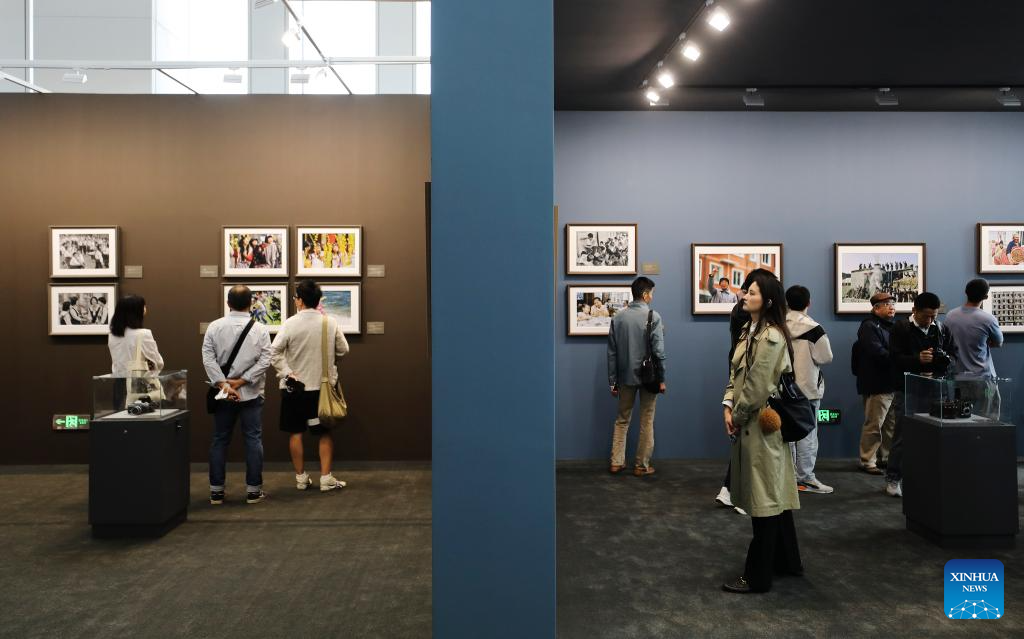Nation ramps up public services to meet rising cultural demand
Night schools, reading clubs mark govt's increased efforts to improve livelihoods


Shanghai resident Wang Yanqing, 38, said that her recent experience of trying to secure a spot in the upcoming autumn courses at the Shanghai Resident Night School took her back to university days, when students had to scramble to register for classes online.
In the blink of an eye, nearly 900,000 eager applicants flooded the system as soon as the night school's registration portal opened. The most sought-after classes for the autumn session of the school spanned a wide range of disciplines, including archery, baking, leather crafting, popping and Brazilian jiu-jitsu.
Priced at a modest 500 yuan for a series of 12 classes, the Shanghai Resident Night School has gained a reputation for its accessibility and top-quality instructors, establishing itself as the hottest public cultural service hub in the city.
Catering to people aged 18 to 55, the night school offers courses during the spring and autumn terms. In the ongoing autumn semester, the service has been expanded to include 37 branch campuses and 367 teaching venues, spanning across the city.
For Wang, who has been learning dance skills at the primary campus of Shanghai Mass Art Center since 2021, the night school represents a vital outlet for personal growth and exploration.
"Elderly people have their senior universities and children have various art training institutions to choose from. We young people also need some public cultural services to develop our interests and add color to our lives," says Wang.
"At the night school, you'll find courses with solid reviews, awesome teachers and prices that are budget-friendly. It's also easy to locate a class close to home," Wang adds.
In recent years, the country has been actively improving the public cultural service system and expanding the coverage of basic public cultural services.
The Resolution of the Central Committee of the Communist Party of China on Further Deepening Reform Comprehensively to Advance Chinese Modernization released in July includes plans for enhancing the public cultural service system.
This includes establishing a mechanism for high-quality cultural resources to reach grassroots levels and enhancing the participation of social entities in the provision of public cultural services.
Li Guoxin, director of Peking University's national center for modern public culture research, explained that the resolution highlights the importance of offering higher quality, more efficient, fairer and sustainable public cultural services to grassroots communities. This is aimed at enhancing people's sense of cultural attainment and happiness.
In recent years, the Chinese government has actively promoted innovation and reform in public cultural services. Over 35,000 new public cultural spaces have been set up nationwide, including libraries and cultural centers in urban and rural areas, making cultural services more accessible for a wider population, Li added.
Hefei, capital of Anhui province, has witnessed active expansion of reading spaces since 2017.
With more than 100 urban reading spaces, urban residents are guaranteed to reach a reading space within a 15-minute walk from their homes.
Ji Yuanyuan, a resident from Hefei's economic development zone, said that the reading space has provided a group of full-time mothers like her with a place where "they can temporarily set aside the family's troubles and worries, and just be themselves".
Formerly an entrepreneur who devoted herself to her career, she used to have her parents take care of her children. After her children started primary school, she decided to devote her time to her children and family.
However, she found that upon returning from the workplace to the family, women easily fell into anxiety. So she initiated a reading club in 2017, where full-time mothers come together to recommend good books to each other and share parenting experiences.
The club's gathering place is called Forest Book House, an urban reading space within her community that not only provides residents with reading facilities but also features workshops on calligraphy and handicrafts.
The book club receives an average of around 400 visitors per day, and last year, it hosted a total of 140,482 readers.
"We now have over 100 female members and hold events every Thursday afternoon at the Book House," Ji said.
"When we meet like-minded people in the space, our anxious feelings fade away, and we feel more uplifted as a whole."
In the first half of the year, the urban reading spaces in Hefei received 4.86 million visitors, with 1.115 million books borrowed and 8,983 events hosted, according to Meng Xianlei, an official from the city's bureau of culture and tourism.
Meng points out that these reading spaces are constructed by the government, owned by the government and operated by third parties through bidding processes. The separation of ownership and operation rights of public cultural facilities shows the reform measures proposed by the aforementioned resolution on further deepening and advancing Chinese modernization.
Starting this year, Hefei is transforming these urban reading spaces into public cultural hubs featuring art exhibitions, training seminars, literary salons, film screenings and a range of other services.
Originally from Guilin in Southwest China's Guangxi Zhuang autonomous region, Wang said she has found pleasure and fulfillment in Shanghai's public cultural amenities, despite the long distance from her hometown.
The abundance of libraries, art centers and communal spaces has not only enriched Wang's own life but has also provided a welcoming place for her mother, who recently traveled from Guilin to Shanghai to live with her.
"She frequents the free movie screenings at the community cultural center near our residence every week. Such public cultural spaces have aided her in swiftly having a social circle in this unfamiliar city," she added.
xingwen@chinadaily.com.cn
- China Focus: China makes great achievements in environmental protection over past 75 years
- Charting China's progress in 75 years (5)
- Hong Kong-Zhuhai-Macao Bridge receives over 20 million passengers this year
- China ramps up public services to meet rising cultural demand
- World Bank report ranks Hong Kong among top 10 global business hubs
- National Day holiday brings box office surge





































